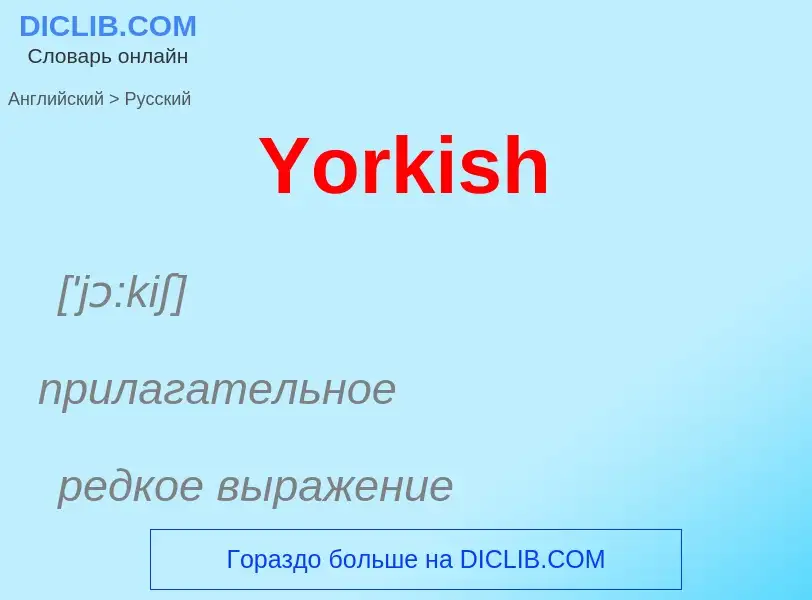Vertaling en analyse van woorden door kunstmatige intelligentie ChatGPT
Op deze pagina kunt u een gedetailleerde analyse krijgen van een woord of zin, geproduceerd met behulp van de beste kunstmatige intelligentietechnologie tot nu toe:
- hoe het woord wordt gebruikt
- gebruiksfrequentie
- het wordt vaker gebruikt in mondelinge of schriftelijke toespraken
- opties voor woordvertaling
- Gebruiksvoorbeelden (meerdere zinnen met vertaling)
- etymologie
Yorkish - vertaling naar russisch
['jɔ:kiʃ]
прилагательное
редкое выражение
относящийся к Йоркширу или городу Йорку
синоним
[jɔ:k]
общая лексика
Йорк (важный транспортный узел на севере Англии; сохранил планировку средневекового крепостного города; там находится самый большой средневековый собор Великобритании, в архитектуре кот. сочетаются раннеанглийский стиль [Early English] и перпендикулярный стиль [Perpendicular style])
синоним
существительное
география
Йорк
Смотрите также
Definitie
Wikipedia

York is a cathedral city in North Yorkshire, England, with Roman origins, sited at the confluence of the rivers Ouse and Foss. It is the historic county town of Yorkshire. The city has many historic buildings and other structures, such as a minster, castle, and city walls. It is the largest settlement and the administrative centre of the wider City of York district.
The city was founded under the name of Eboracum in 71 AD. It then became the capital of the Roman province of Britannia Inferior, and later of the kingdoms of Deira, Northumbria, and Scandinavian York. In the Middle Ages, it became the northern England ecclesiastical province's centre, and grew as a wool-trading centre. In the 19th century, it became a major railway network hub and confectionery manufacturing centre. During the Second World War, part of the Baedeker Blitz bombed the city; it was less affected by the war than other northern cities, with several historic buildings being gutted and restored up to the 1960s.
The city is one of 15 in England to have a lord mayor, and one of three to have "The Right Honourable" title affixed, the others being London's and Bristol's. Historic governance of the city was as a county corporate, not included in the county's riding system. The city has since been covered by a municipal borough, county borough, and since 1996 a non-metropolitan district (the City of York), which also includes surrounding villages and rural areas, and the town of Haxby. The current district's local council is responsible for providing all local services and facilities throughout this area. The city had a population of 153,717 in the 2011 census; the wider district had a population of 198,100. According to 2021 census data, the wider district has a population of 202,800, a 2.4% increase compared to the 2011 census.





.jpg?width=200)



.jpg?width=200)
.jpg?width=200)



.jpg?width=200)




![The Press]]'' on Walmgate The Press]]'' on Walmgate](https://commons.wikimedia.org/wiki/Special:FilePath/The Press, York (geograph 6247772).jpg?width=200)



.jpg?width=200)




.jpg?width=200)


.jpg?width=200)




![[[The Shambles]] is a medieval shopping street; most of the buildings date from between {{circa}} 1350 and 1475 [[The Shambles]] is a medieval shopping street; most of the buildings date from between {{circa}} 1350 and 1475](https://commons.wikimedia.org/wiki/Special:FilePath/Shambles shopper 8686.jpg?width=200)
![The [[Art Deco]] style Odeon Cinema on Blossom Street The [[Art Deco]] style Odeon Cinema on Blossom Street](https://commons.wikimedia.org/wiki/Special:FilePath/Odeon Cinema 3.jpg?width=200)
![The 1960s [[Brutalist]]-style Stonebow House The 1960s [[Brutalist]]-style Stonebow House](https://commons.wikimedia.org/wiki/Special:FilePath/Stonebow House, York.jpg?width=200)
